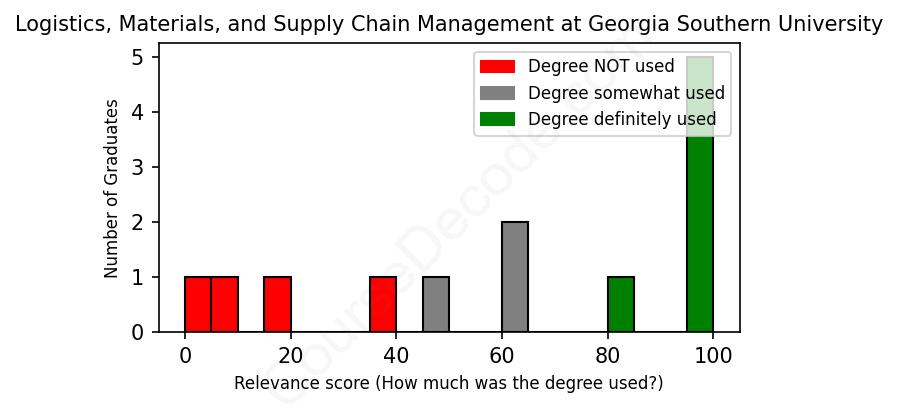
First, some facts. Of the Logistics, Materials, and Supply Chain Management graduates from Georgia Southern University we've analyzed , here's how many have used (or NOT used) their degree in their career:

These are estimates based on AI analysis of 13 LinkedIn profiles (see below).
The verdict? Slightly below average. Overall, with an average relevance score of 62%, Logistics, Materials, and Supply Chain Management graduates from Georgia Southern University have a slightly lower likelihood (-5%) of finding work in this field compared to the average graduate across all fields:
And for comparison, here's the chart for all profiles we've looked at across all degrees.
Also, after graduating, only 0% of these graduates have pursued further education other than another Bachelor's degree (such as a Masters degree or other), compared to the average across all profiles of 35%. This suggests a Bachelors degree is enough for most Logistics, Materials, and Supply Chain Management graduates, and it's normal to look for work straight after graduation.
See the details:
|
Relevance score: 38% We think this person has NOT gone into a career related to their degree. We think this person has NOT gone into a career related to their degree.
DEGREE INFOGraduated in 2019 from Georgia Southern University with a Bachelor of Business Administration - BBA in Logistics, Materials, and Supply Chain Management. No other secondary education since. JOB HISTORY SINCE GRADUATIONRecruiter Maxim Healthcare Services Nov 2019 - Jun 2024 Senior Mold Analyst  Mold Test Company Mar 2023 - Present ABOUTNo information provided. |
The top 10 most common jobs done by the graduates we've analyzed (ranked most common to least) are:
When looking at the job paths of graduates from Georgia Southern University's Logistics, Materials, and Supply Chain Management program, it’s clear that there's a mix of directly relevant roles and some that stray pretty far from the core curriculum. Many graduates have found themselves in roles like Logistics Planner, Inventory Analyst, and Operations Supervisor, where they can apply what they learned about supply chains and logistics management directly to their jobs. These positions typically require a solid understanding of the industry's principles, so it’s awesome to see a good number of alumni in these relevant roles.
However, there are also a fair number of grads who ended up in jobs that don’t really connect to their degree at all, like Sales Cashiers, Bankers, and Insurance Agents. These jobs focus more on customer service or sales and don't often use the specialized knowledge gained from their studies. So, while it’s great that some are thriving in fields related to logistics, it appears that certain graduates have ventured into areas that don’t leverage their expertise in supply chain management. Overall, there's a solid representation of alumni working in relevant roles, but also some who have taken a different path and aren't using their degree as much in their day-to-day work.
Here is a visual representation of the most common words in job titles for Logistics, Materials, and Supply Chain Management graduates (this is across all Logistics, Materials, and Supply Chain Management graduates we've analyzed, not just those who went to Georgia Southern University):

Graduates from Georgia Southern University with a degree in Logistics, Materials, and Supply Chain Management seem to have quite a diverse array of career paths. Right after graduation, many of them land jobs that are closely related to logistics and supply chain roles, such as logistics coordinators or material control specialists. For example, the 2014 grad is still working as a logistics coordinator years later, which suggests a stable entry into the field. Some took a little detour early in their careers, like the 2010 graduate who moved through various roles, including a stint as a baker and retail manager, but it seems they eventually found their way back to more traditional logistics roles, such as becoming a Universal Banker. So, while some started in logistics, others ventured into different industries before returning or transitioning into supply chain positions down the line.
Fast forward a few years, and you see a mix of people staying in the logistics field and those who have shifted to different careers. Many of them have progressed to more senior roles, like project planning manager or operations supervisor, which indicates a solid career trajectory overall. There are a few examples, though, of graduates ending up in jobs that are not directly related, like real estate or insurance. But that doesn’t necessarily mean those paths are unsuccessful; it just shows that some grads have found their niche outside traditional logistics roles. Overall, it looks like most of these grads find good opportunities, especially within logistics and supply chain management, indicating that this degree can lead to fulfilling careers in that space.
Honestly, a Bachelor’s degree in Logistics, Materials, and Supply Chain Management can be a mix of challenging and manageable, and at Georgia Southern University, it’s pretty much in line with what you'd expect from a typical business degree. You’ll dive into subjects like operations, inventory management, and maybe some analytics, which can get a bit technical, but a lot of students find it interesting and practical. If you’ve got a knack for problem-solving and enjoy considering how goods move from point A to B, you might not struggle too much. Overall, it's not overwhelmingly hard, but you definitely need to stay organized and keep up with the coursework like you would in any college program. Just like with any degree, if you put in the effort and stay on top of things, you’ll likely do just fine!
Most commonly, in the LinkedIn profiles we've looked at, it takes people 4 years to finish a Bachelor degree in Logistics, Materials, and Supply Chain Management.
Looking at the career paths of these Georgia Southern graduates, it seems like a mixed bag in terms of earnings. Some of the earlier grads, like the ones from 2010 and 2015, have had a few different roles and seem to have gradually climbed the ladder from logistics to managerial positions, which usually come with better pay. On the other hand, recent grads are just starting out, with a few in entry-level jobs, but several are quickly moving up into supervisory roles, which indicates they might be on track for decent pay soon. Overall, while some may have hit the jackpot, others are still working their way up, so it really depends on how quickly they can advance and how those industries pay in the long run.
Here is a visual representation of the most common words seen in the "about" section of LinkedIn profiles who have a Bachelor degree in Logistics, Materials, and Supply Chain Management (this is across all Logistics, Materials, and Supply Chain Management graduates we've analyzed, not just those who went to Georgia Southern University). This may or may not be useful:

Here are all colleges offering a Bachelor degree in Logistics, Materials, and Supply Chain Management (ordered by the average relevance score of their Logistics, Materials, and Supply Chain Management graduates, best to worst) where we have analyzed at least 10 of their graduates:
| College | Score | Count |
|---|---|---|
 Michigan State University Michigan State University
|
84 | 23 |
 Auburn University Auburn University
|
83 | 19 |
 Ashford University Ashford University
|
82 | 12 |
 University of Wisconsin-Milwaukee University of Wisconsin-Milwaukee
|
81 | 10 |
 Rutgers Business School Rutgers Business School
|
79 | 24 |
 Penn State University Penn State University
|
78 | 21 |
 Embry-Riddle Aeronautical University Embry-Riddle Aeronautical University
|
78 | 10 |
 Arizona State University - W. P. Carey School of Business Arizona State University - W. P. Carey School of Business
|
78 | 14 |
 Iowa State University Iowa State University
|
77 | 14 |
 University of Houston University of Houston
|
76 | 30 |
 University of Arkansas University of Arkansas
|
76 | 18 |
 University of Tennessee, Knoxville University of Tennessee, Knoxville
|
75 | 15 |
 University of North Texas University of North Texas
|
69 | 14 |
 Texas A&M University Texas A&M University
|
67 | 27 |
 Georgia Southern University Georgia Southern University
|
62 | 13 |
 The Ohio State University The Ohio State University
|
60 | 10 |
 University of Houston-Downtown University of Houston-Downtown
|
57 | 13 |